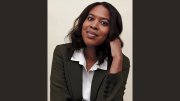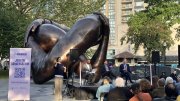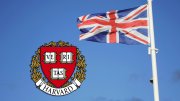How to Read the Bible: A Guide to Scripture, Then and Now (Free Press, $35), by James L. Kugel, formerly Starr professor of Hebrew literature (see “Final Architect,” January-February 2004, page 36). Not CliffsNotes; 689 pages of text on reading the Good Book, by the maestro of the Core course “The Bible and Its Interpreters.”
Body Drama, by Nancy Amanda Redd ’03 (Gotham, $20, paper). The 2004 Miss America contestant, with an assist from the director of Mount Sinai’s Adolescent Health Center, writes a frank—and frankly illustrated, with photographs—tour of growing girls’ concerns from acne and breast development to weight, pregnancy, and genital warts.
Nobel Faces: A Gallery of Nobel Prize Winners, by Peter Badge (Wiley-Blackwell, $95). Badge’s eloquent black-and-white portraits of some 270 laureates, with accompanying brief narratives by Chris Richmond; poet Seamus Heaney, biologist Walter Gilbert, chemists Elias J. Corey and Dudley R. Herschbach, and diplomat Henry A. Kissinger are among the Harvardians depicted.
Please Don’t Remain Calm: Provocations and Commentaries, by Michael Kinsley ’72, J.D. ’77 (Norton, $25.95). The writer of opinions (The New Republic, Slate, Los Angeles Times, etc., and now Time) collects samples from the past dozen years. Reflecting on airport security lines in 2002 (“…the major war effort imposed on civilians…”), he finds a “need to think about it for a few more hours. And I think I know where I’ll find the time.”
What Is Emotion? History, Measures, and Meanings, by Jerome Kagan (Yale, $27.50). The Starch professor of psychology emeritus wades into the “empirically lean and theoretically contentious understanding of emotion-al phenomena” and finds himself “adopt[ing] a skeptical stance toward the existence of a small set of basic emotions.” Kagan writes, “Poets possess the license to use a predicate any way they wish,” but this is very much a scientist’s book.
Straddling Worlds: The Jewish-American Journey of Professor Richard W. Leopold, by Steven J. Harper, J.D. ’79 (Northwestern, $35). An oral history of historian Leopold, Ph.D. ’38. His education included spirited “fist-ball” games (a volleyball variant) with the Law School’s Erwin N. Griswold, historian John K. Fairbank, and physicist Percy Bridgman, a future Nobelist and all-out competitor.
The Fortune Cookie Chronicles: Adventures in the World of Chinese Food, by Jennifer 8. Lee ’99 (Twelve, $24.99). The author, formerly a Ledecky Undergraduate Fellow of this magazine, now a New York Times metropolitan reporter, probes the ethos of the nearly 40,000 Chinese restaurants in the United States, and beyond, fearlessly addressing “the Kosher Duck Scandal of 1989” and, like Margaret Mead, reporting the tragic fate of the “bean-sprout people.”








